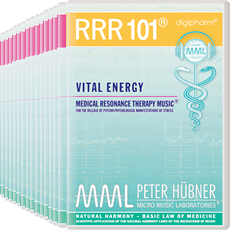| digipharm® |
| Home • Site Map • Research • Reports • International Experts • Music Preparations • Fundamentals • News • Questions • Shop |
| digipharm® |
| peter huebner • micro music laboratories |
| M E D I C A L R E S O N A N C E T H E R A P Y M U S I C® |
| R E D U C T I O N O F P S Y C H O – P H Y S I O L O G I C A L M A N I F E S T A T I O N S O F S T R E S S |
Scientific Studies and Clinical Observations – Summary
Health of the Elderly
- Release of psycho-physiological manifestations of stress in older patients with atherosclerotic encephalopathy: The patients experienced very often a deep muscular relaxation combined with a sensation of warmth and with ease and sleepiness. Furthermore the symptoms “bad mood”, “lethargy”, “tension” and “touchiness” were significantly reduced or even completely released. Over and over again they reported of a release of stress, of the acquisition of distance from unpleasant things, the experience of gentleness, inner peace, a kind of freedom from care and a spiritual state of mind.
- Slowing of the heart rate in older people and people of middle age: from the third session on, a reduction in the heart rate averaging 5 beats per minute was evident during the relaxing MRT-Music® and averaging 3.1 beats per minute during the activating MRT-Music®.
- Improved learning ability in older people with atherosclerotic encephalopathy: Regarding learning ability the performance had improved after 10 treatments with MRT-Music® by 18% on average.
- Improved concentration in people with atherosclerotic encephalopathy: Regarding concentration the performance had improved after 10 treatments with MRT-Music® by 18% on average.
- Improved reaction speed in people with atherosclerotic encephalopathy: Regarding reaction speed the performance had improved after 10 treatments with MRT-Music® by 18% on average.
- Improved visual short-term memory in people with atherosclerotic encephalopathy: Regarding visual short-term memory the performance had improved after 10 treatments with MRT-Music® by 20% on average.
- Improved visual-motoric co-ordination in people with atherosclerotic encephalopathy: Regarding visual-motoric co-ordination the performance had improved after 10 treatments with MRT-Music® by 18% on average.
- Enhanced psycho-motoric speed in people with atherosclerotic encephalopathy: Regarding psychomotoric speed the performance had improved after 10 treatments with MRT-Music® by 9,6% on average.
- Improving reaction precision in people with atherosclerotic encephalopathy: Regarding reaction precision the performance had improved after 10 treatments with MRT-Music® by 18% on average.
- Improved auditory memory in older patients with atherosclerotic encephalopathy: Regarding auditory memory the performance had improved after 10 treatments with MRT-Music® by 8,1% on average.
- Complete dispersion of dizziness in 70% and significant reduction in 30% of a group of older people and people of middle-age with atherosclerotic encephalopathy: of the 25 patients examined, 20 reported attacks of dizziness. After treatment with MRT-Music® 14 patients were free from attacks of dizziness and 6 reported a significant improvement.
- Reduction of headaches in older people and people of middle-age with atherosclerotic encephalopathy: of the 25 patients examined 21 had headaches. After the treatment 15 patients were free of headaches, 5 experienced a significant improvement and one patient experienced no improvement.
- Release of reactive anxiety in older patients and people of middle-age with atherosclerotic encephalopathy: The anxiety levels were evaluated using the Spielberger-Khanin-Scale, documenting the following effects of the Medical Resonance Therapy Music® – after the relaxing MRT-Music® a reduction of the reactive anxiety by 4 units (}0.8) was registered and after the activating MRT-Music® a reduction by 6 units (}0.65).
- Improved auditory memory in older patients with atherosclerotic encephalopathy: In most of the physical, psychological, sensory and mental performance parameter – except the parameter heart rate and anxiety – there were only slight but not statistically significant changes registered after each treatment. But at the end of the 10 treatments clear changes in comparison to the beginning of the treatment had become obvious. This indicates a training effect with the Medical Resonance Therapy Music®, which probably will be of great value in chronic diseases. Regarding auditory memory the performance had improved after 10 treatments with MRT-Music® by 8,1% on average.
 |
For this indication please use the program:
VITAL ENERGY |
||
| If you want to look at the studies in detail, please visit:
SCIENTIFIC STUDIES & CLINICAL OBSERVATIONS – COMPLETE STUDIES |
|||
With kind permission of AAR EDITION INTERNATIONAL
© 1998- DIGIPHARM >
© 1998- DIGIPHARM >